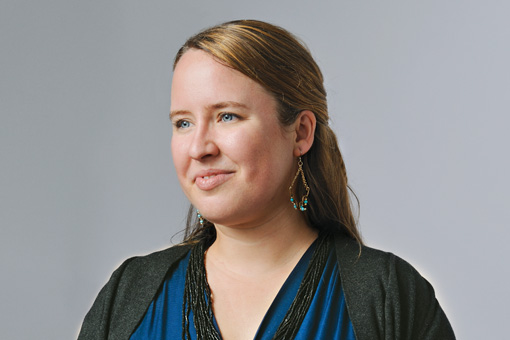View a video interview with Ruth DeGolia below.
Ruth DeGolia, 31, is living proof that an idealistic college student can make a difference.
As founder and executive director of Mercado Global, a Brooklyn, New York–based nonprofit now in its ninth year, DeGolia and her team have earned the respect of both businesses and philanthropic organizations for connecting rural Guatemalan artisans to the mainstream fashion market in the United States and for pioneering a high-impact, fair-trade business model that addresses the causes—not just the effects—of cyclical poverty.
The concept was born when DeGolia, then a senior at Yale, was writing her thesis and volunteering in Guatemala in the early 2000s. While spending summers in Quetzaltenango working with economically disadvantaged women’s cooperatives under a program operated by the national Asociación Mayalan, she met many Guatemalans who had survived the brutality of the country’s bloody 36-year civil war only to be faced with extreme economic hardships. Some could not afford to feed their families, much less send their children to school (even public school is not free in Guatemala).
Meanwhile, international aid to Guatemala was drying up. The signing of the 1996 Peace Accords had reduced the urgency of donors to assist with the rebuilding of Guatemalan civil society. DeGolia knew that scholarships or a “one-time charity give” would not make a long-term difference. Guatemala’s world-renowned Indigenous handicrafts offered a path out of poverty, but sustainable income would only come from expanded market access.
So DeGolia filled up a suitcase with her new friends’ handicrafts and headed back to Yale. Within days, her fellow students had bought enough of the beaded bags, jewelry and scarves to provide income for 30 of the artisans for a full month—with enough left over to send 10 of their daughters to school for a year. DeGolia quickly saw the opportunity for scaling up the concept through formalizing connections between the rural craftspeople and retailers in the global market. In 2004, she drew up a business plan. Mercado Global was born.
Today, the business helps employ over 400 artisans across 30 highland communities in Guatemala, and is rapidly expanding. The majority of the women working with Mercado Global never went to school and are illiterate; yet all participate in community-based training programs led by Indigenous women that focus on financial literacy, business management, self-esteem, and family health. The programs help the women manage and legalize their cooperatives, set up bank accounts, manage cash flow, invest in tools and technology, and design products for a U.S. market.
Ninety-two percent of Mercado Global artisans now send their children to public school with the income they earn through selling handicrafts. That has contributed to a near-30 percent increase in school enrollment rates within two years for artisan families that have partnered with Mercado Global. One woman, using her earnings as collateral, obtained a small loan from a local bank to build her family’s first home.
In contrast to other fair trade models, Mercado Global is working with volume on a global scale, directly connecting these rural women to the market. Today, the bags and jewelry crafted by women in the Guatemalan highlands are being sold to high-end retail stores like Anthropologie, Bloomingdale’s and Lucky Brand—and in cities like New York, Tokyo and Montreal. The trendy jewelry and accessories cost between $20 and $350.
After covering base operating costs (roughly 50 cents for every $1 sold), all profits from the merchandise are returned to the Guatemalan women’s cooperatives. DeGolia’s team in Guatemala helps each cooperative set up a pricing system for its products, pay its taxes and create a savings account.
Today, Mercado Global is aggressively building new Guatemalan cooperatives and multiplying the number of international retailers selling its goods before it moves forward with plans to expand its model to the rest of Latin America.
“Focusing on partnerships for long-term and sustainable income for Indigenous artisans in Guatemala does good,” DeGolia says, “But more importantly, it does well for the women.”
View a video interview with Ruth DeGolia below.




